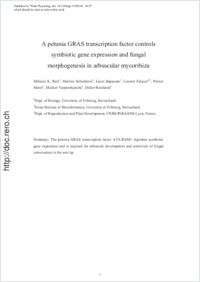A petunia GRAS transcription factor controls symbiotic gene expression and fungal morphogenesis in arbuscular mycorrhiza
- Rich, Mélanie K. 1Dept. of Biology, University of Fribourg, Switzerland
- Schorderet, Martine 1Dept. of Biology, University of Fribourg, Switzerland
- Bapaume, Laure 1Dept. of Biology, University of Fribourg, Switzerland
- Falquet, Laurent 1Dept. of Biology, University of Fribourg, Switzerland - Swiss Institute of Bioinformatics, University of Fribourg, Switzerland
- Morel, Patrice Dept. of Reproduction and Plant Development, CNRS/INRA/ENS Lyon, France
- Vandenbussche, Michiel Dept. of Reproduction and Plant Development, CNRS/INRA/ENS Lyon, France
- Reinhardt, Didier 1Dept. of Biology, University of Fribourg, Switzerland
-
13.05.2015
Published in:
- Plant Physiology. - 2015, vol. 168, no. 3, p. 788-797
English
Arbuscular mycorrhiza (AM) is a mutual symbiosis that involves a complex symbiotic interface over which nutrients are exchanged between the plant host and the AM fungus. Dozens of genes in the host are required for the establishment and functioning of the interaction, among them nutrient transporters that mediate the uptake of mineral nutrients delivered by the fungal arbuscules. We have isolated in a genetic mutant screen a petunia GRAS-type transcription factor, ATYPICAL ARBUSCULE (ATA), that acts as the central regulator of AM-related genes and is required for the morphogenesis of arbuscules. Forced mycorrhizal inoculations from neighbouring wild type plants revealed an additional role of ATA in restricting mycorrhizal colonization of the root meristem. The lack of ATA, which represents the orthologue of RAM1 in Medicago truncatula, renders the interaction completely ineffective, hence demonstrating the central role of AM-related genes for arbuscule development and function.
- Faculty
- Faculté des sciences et de médecine
- Department
- Département de Biologie
- Language
-
- English
- Classification
- Biological sciences
- License
-
License undefined
- Identifiers
-
- RERO DOC 255657
- DOI 10.1104/pp.15.00310
- Persistent URL
- https://folia.unifr.ch/unifr/documents/304419
Statistics
Document views: 141
File downloads:
- pdf: 244
